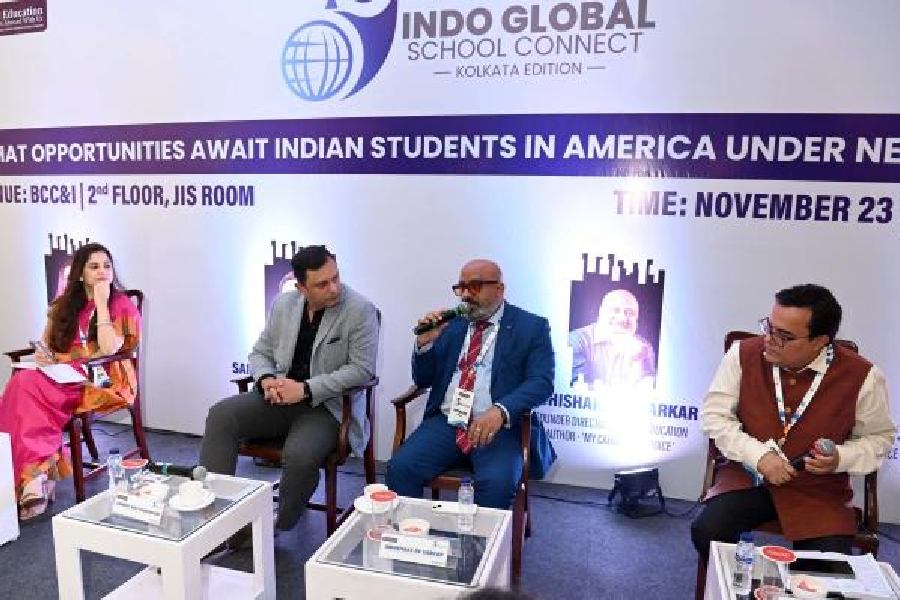Across the Atlantic, many hope Donald Trump’s campaign rhetoric was just that. Like a jumla maybe?
Overseas education counsellors are hoping that Trump’s hard stance on illegal immigration turns out to be campaign rhetoric when it comes to Indian students aspiring for higher studies in the US.
“Trump is set to tighten immigration rules and reduce H1B visas. The Trump campaign kept talking about discontinuing automatic citizenship to children born to immigrants. These are all campaign rhetoric. We know that what is said in a campaign is not necessarily implemented as policy,” Ujjwal K Chowdhury, vice-president of Washington University, said at a programme in Calcutta on Saturday.
“The US gains a lot of revenue from F1 visas for international students. US universities get huge revenue from Indian students in the form of tuition fees. So full tuition fee-paid admission and the grant of visas to them may not be affected. That is my assumption. Because they will not gain anything out of it. Trump is a businessman after all,” he told an audience comprising school principals, teachers and students.
Jumla literally means idiomatic expression but it has come to stand for “gimmicks” ever since Amit Shah used the word in 2015 to explain why each Indian’s bank account was not richer by ₹15 lakh as many voters had hoped for when they voted for Narendra Modi in the 2014 general election.
In the US, Trump had been advocating the scrapping of the H-1B visa programme from the beginning of his campaign as he thinks it is “very unfair” for American workers and has been taking away their jobs.
IT professionals from India and major Indian IT companies are beneficiaries of H-1B, a non-immigrant visa in the US that allows American employers to temporarily employ foreign workers in speciality occupations. An F-1 visa is a non-immigrant visa that allows international students to study in the US at an accredited institution.
“If you go by the utterances at Trump campaign rallies, there is a possibility of reduction in H1B visas. There may be a cut-down. Expect tighter visa regulations, stricter background checks,” said Chowdhury.
He was part of a panel discussion on The Future of Indian Students in the Trump-Era at the Bengal Chamber of Commerce and Industry.
Samrat Ray Chaudhuri, assistant vice-president of Webster University and a co-panellist, said two programmes that allow international students to work in the US may come under threat in the Trump presidency.
“The optional practical training (a temporary employment-authorisation programme that allows international students in the US to work after they have graduated) and the curricular practical training (a programme that allows F-1 students to work and gain experience related to their major) may come under threat because there is a perception that they take away US jobs,” Ray Chaudhuri said.
Ray Chaudhuri said: “OPT does not have any legislative standing. It was not passed by the House or the Senate. It is an order from the department of education signed by the President. That is why it hangs on a thin thread. But it has been there for a long time. There is no evidence to believe that Trump 2.0 will cut down on OPT features because Trump 1.0 did not do that. We would hope that this is not affected. Today, 2,83,000 students are on OPT, many of them from India.”
According to the latest Open Doors Report, the number of Indian students studying in the US in the academic year 2023-24 is at an “all-time high” at 3,31,602, a rise of 23 per cent from 2022-23 when the number stood at 2,68,923.
India has knocked China off the top seat for the first time since 2009, according to figures released by the US state department and the non-profit Institute of International Education on Monday.
The panel discussion was moderated by Saira Shah Halim, educator and activist. Abhishake De Sarkar, the founder-director of Advent Education, was the third speaker on the panel.
The minimum cost of a four-year programme at the US is upwards of ₹1.25 crore, he said.
Satabdi Bhattacharjee, principal of South City International School, who was in the audience, told Metro: “Some of the scholarship programmes discussed today, signing MoUs with schools, taking students on a tour of the universities — these are useful. I think it was a very important session.”










